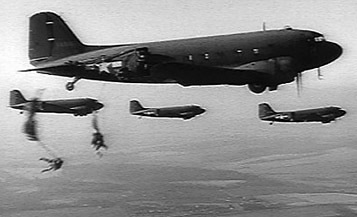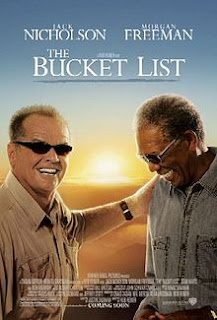The Latest Generation
Last weekend the plane my daughter and I were flying in was shot down over the Normandy Peninsula near the French coastline. Before we parachuted to safety, bullets had riddled the crowded cabin igniting a frantic stampede among the passengers scrambling for the rear door. Only three of us made it out alive.
Or at least that is what the recording made by a World War II veteran explained to us at the Greatest Generation exhibit on display at the Minnesota History Center. We were seated in a darkened tail section of an authentic C-47 Skytrain for a seven minute audio/video presentation. Unseen special effects were added to simulate a low-level flight over the English Channel. View screens instead of windows displayed passing clouds, while continuous flak from German ground fire shook the "plane," and finally we had the real sense that we were spinning in for a crash landing.

Try as I might, I couldn't emotionally put myself in the shoes of the thousands of young men in the hundreds of planes that June night - or in amphibious boats the next morning - who must have been quietly terrified at the task that lay before them. How could I? In a few short minutes, my daughter and I would stand up and, almost reverently, walk out the aft doorway to re-emerge into the 21st century - back to relative safety, comfort and ease.
We continued to stroll through the exhibit which detailed so much about the daily lives of the American people who came of age during that world war. Having already endured the humbling misery of the Great Depression, young Americans uncomplainingly enlisted into the armed forces, or found work in one of the thousands of defense plants that would soon produce armaments of all kinds which would supply the Allied war effort. First-person stories of sacrifices Americans made typically ended with the humble remark, "it's just what everyone did."
The exhibit concluded with displays of the new America this Greatest Generation made upon their return from war. Factories were converted back to peacetime production and a new consumer culture - with a boost from the (m)ad men of Madison Avenue - thrived. We sat in front of 13-inch black and white wood-paneled television sets, glanced at pictures of new (now very old) suburbs, and chuckled at the clothing of the bobbysoxers or the practiced sneers of the Elvis and James Dean wannabees.
As much as I happily soaked in all of the (now) vintage culture of the mid-20th century, my thoughts lingered on that old veteran's re-telling of the training, teamwork and eventual terror he and his comrades withstood in the skies over Nazi-occupied France. Asked in 1944 or 2014, he most likely would have modestly remark, "it's just what everyone did."
To be fair, no one moment, decade or generation of history can be critiqued in isolation. Americans of this Tom Brokaw-labeled Greatest Generation were no more inherently noble than the men and women who came before or followed after. Rather, it was their collective response to world events that ennobled them. Sure there were scoundrels and scofflaws aplenty back then, but anything approaching such unity of purpose today seems impossible in our culturally-fragmented century.
Sadly, world history tells us over and over that this sort unity is only possible if two conditions are present in a culture. The first is a totalitarian system of government. An unelected leadership wielding the support of a nation's military like a big stick can still marshal the forces of an unwilling labor pool to produce massive public works. For a modern example, look no further than the economic transformation of China since the Tiananmen Square protests of 1989. Still not truly free, some Chinese people were offered the carrot of financial prosperity, but borne on the backs of an impoverished labor and migrant class. The deal was struck.
The second condition necessary for national unity is no longer possible in modern America - a foreign power threatening our way of life. For all of our military adventures since the end of World War II, no adversary has truly imperiled us, including the Soviet Union. Our borders are impenetrable behind two wide oceans; our security - despite acts of terrorism - remains. Even the events of September 11, 2001 failed to unify us for very long - as patriotism's meaning was twisted into a Love It or Leave It definition, rather than one in which dissent is viewed as a healthy part of a democratic system. Heaven help a politician who doesn't wear a lapel flag pin these days. Unelectable.
With the supposed arrival of spring, I have started running again. Maybe our national sense of purpose is as out of shape as my leg muscles. The first ungainly steps are peppered with aches, pains and complaints, followed by cries of protest and pouting. I can't do it. It's too hard. Too much time has gone by. When will all this sacrifice yield results? The surest way I motivate myself is to put a race on the calendar - one far enough in the future to give me time to train and show improvement - where I can see that all my effort and sacrifice was worth it.
Obviously, we aren't the same America of those bygone days. We are more diverse, our economy more precarious, our politics much uglier. Consequently, we are more divisive and less trusting of our elected leaders. The means of production and information are controlled by fewer and fewer corporations and individuals. And yet we are largely complacent. Our collective leg muscles have atrophied to the point where we no longer know how to respond with indignation to government-sanctioned breaches of our privacy, or the killing of our children in schools, or the FDA-approved "poisoning" of our food with all manner of harmful preservatives. And much, much more. .
I'm vaguely worried that we won't get off the couch and start running until it's too late - that we won't know how to successfully demand honesty, transparency, compassion and corrective action from corporations and governments - that we will have so completely lost our voice from lack of use to shout loud enough - NO! - when we are clearly being lied to by slick ads and slicker politicians, buoyed by their designated "news" outlets.
Rome too, eventually fell. Once a miraculous republic of political and technological innovation (sound familiar?), it crumbled from within, its bureaucracy twisted into a self-serving, bloated empire (sound even more familiar?). I don't want to believe our nation is spiraling towards an inevitable but self-induced Roman decline. But history ignored seems to doggedly be history repeated.
Odd, the thoughts that can creep in during seven minutes spent in the tail section of a C-47 Skytrain on a Sunday afternoon.
Maybe it's time for a run . . .


Comments
Post a Comment